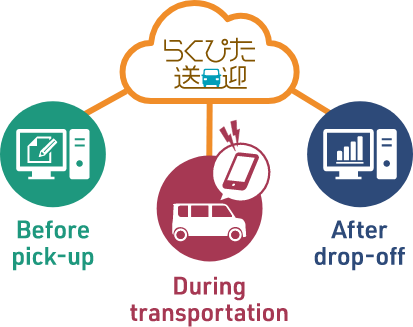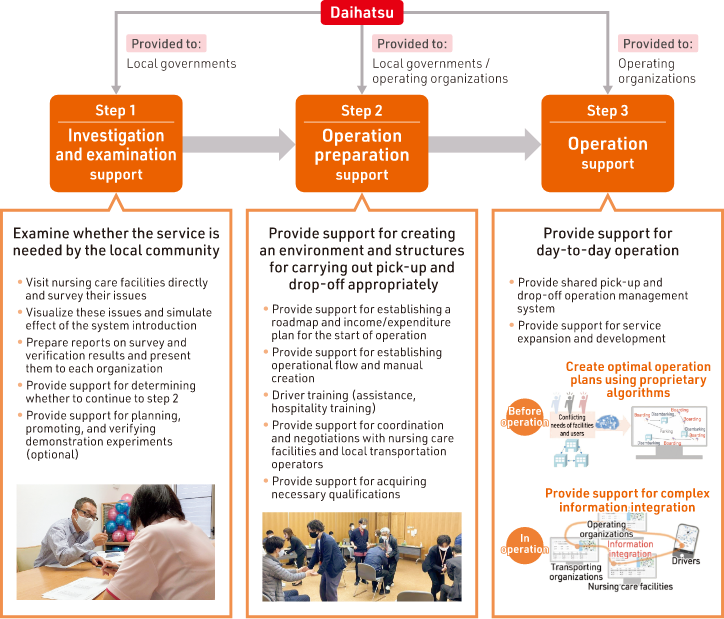Contribution to Local Communities
-
Fundamental Approach
-
Contribution to Local Communities
-
Initiatives at Overseas Business Sites
RAKUPITA SOUGEI Operation Management System for Social Welfare and Nursing Care Facilities
Daihatsu is committed to providing solutions that are tailored to the needs of customers and local communities.
One of our activities is the RAKUPITA SOUGEI pick-up and drop-off nursing care operational support system for adult nursing care and welfare facilities. Pick-up and drop-off accounts for around 30% of a facility’s operations and causes a psychological burden for around 60% of caregivers. RAKUPITA SOUGEI is a service that helps improve the productivity of nursing care facilities. The system achieves this by using a cloud system and smartphone app to change the traditional method of manual pick-up and drop-off operations and by solving problems that occur before pick-up, during transportation, and after drop-off. This service is already in use at many facilities throughout Japan and helps to satisfy pick-up and drop-off planners, drivers, administrators, users, and their families.
The service has also been publicly recognized, receiving the MaaS & Innovative Business Model Award 20201 Grand Prix and the New Business Model Award at the ASPIC IoT/AI/Cloud Awards 20212.
1. An award for innovative products, services, and businesses in the MaaS and other mobility technology fields; revolutionary initiatives and partnerships that have societal significance; and novel attempts to overturn existing transportation and lifestyles
2. An award presented by the ASP-SaaS-AI-IoT Cloud Industry Association (ASPIC) to recognize excellent and socially beneficial cloud services in Japan
Voice from Customers Using RAKUPITA SOUGEI
Lowering the burden on nursing staff and standardizing their work, creating more time for them to spend on care

Kota Doi
YAMAUCHI Co., Ltd.
Joy Rehabilitation
Plus Daishimae (at time of interview) Manager
It is very time-consuming to create pick-up and drop-off plans. Moreover, with regular job rotations and other factors, there was a tendency for the work to be overly dependent on specific workers. With the introduction of RAKUPITA SOUGEI, it has become easy to look up user addresses on the computer map and plan out optimal routes. Now anyone can quickly create plans, making the work standardized and more efficient. There are also fewer losses due to lack of communication as drop-off and pick-up data is regularly updated and shared with drivers instantly.
During pick up and drop off, it is possible to use the smartphone app to look up and confirm information, dramatically reducing worries about personal data leaks stemming from documents being physically removed from storage. Cutting down on the workload burden of pick-ups and drop-offs generated leeway and time that has been allocated to better serving nursing facility users, inevitably producing a better nursing environment. As users receive more thorough and attentive care, it benefits the reputation of the nursing services in the community and contributes positively to the workplace environment, benefiting hiring and worker retention.
Goissho Shared Pick-up and Drop-off Service for Social Welfare and Nursing Care Facilities

Daihatsu has focused on reducing the burden of pick-up and drop-off operations at nursing care facilities through RAKUPITA SOUGEI, a pick-up and drop-off nursing care operational support system that has been offered since 2018. We have examined business models in which pick-up and drop-off operations conducted at each adult daycare site are shared by entire communities as a solution to the shortage of nursing care personnel, which is becoming more serious due to increased demand caused by an aging population. As a result, we developed a system that enables the creation of pick-up and drop-off plans across multiple facilities as well as complex information integration and operation management. This system, the Goissho shared pick-up and drop-off service for social welfare and nursing care facilities, was launched in 2022. Since most pick-up and drop-off operations at adult daycare facilities are in the morning and evening, this service allows free time and vehicles to be used for daily mobility services such as shopping and hospital visits. Goissho has already been implemented in Mitoyo City, Kagawa Prefecture and Yasu City, Shiga Prefecture, and there are demonstration experiments underway in multiple other areas. The service has received high marks across the board, having received a Best Four pick at the Japanese government’s FY2022 Digi-den Koshien1 event, a Good Focus Award (Design of Community Development) at the GOOD DESIGN AWARD 20232, and it received a gold medal at the KANSAI DX AWARD 20243.
Through Goissho, we will continue to work toward solving the shortage of nursing care personnel and mobility issues in local communities.
1. Established to strongly promote Japan’s “Digital Garden City Nation” Concept all over the country and generate momentum toward achieving its implementation, the Digi-den Koshien event invites the submission of initiatives from a wide range of private companies and organizations, awarding the best initiatives with the Prime Minister’s Award.
2. Initiative focused on improving life and society through good design. Defining design as something created by people to fulfill some ideal or purpose, this award commends and recognizes designs of all types found throughout our lives, including products, architecture, software, systems, and services.
3. Award given to companies in the Kansai region which have taken the initiative in tackling DX.
Structure of Goissho
Creating a Regional Circular and Ecological Sphere in Ryuoh Town, Shiga Prefecture Through Collaboration Among Crop Farmers, Livestock Farmers, and Industry1
Under its Environmental Action Plan 2030, Daihatsu is taking action with consideration for local production and consumption, and for contribution to local communities with the aim of decarbonizing the energy used at its plants. We are participating in the new collaboration among crop farmers, livestock farmers, and industry promoted by Ryuoh Town2, where the Shiga (Ryuoh) Plant is located. Our contribution is to work on methane fermentation technology development using dung from Omi cattle in an effort to create a regional circular and ecological sphere. Generating energy (biogas) from the dung produced when raising Omi cattle, which is an important local industry, and using it for plant operations will support decarbonization. The residue can be returned to farmland as organic fertilizer, thereby creating a regional circular and ecological sphere.
The purpose of biogas is to use it as a carbon neutral fuel in aluminum melting furnaces and power generators.
Proof-of-concept experiments have begun with rice, wheat, and cabbage crops, using compost and liquid fertilizer made from fermentation residues with the aim of eventually using it with many of Ryuoh’s agricultural products. Experiments conducted since 2023 have shown that these composts and liquid fertilizers are just as effective as traditional composts, and future evidential experiments will further expand cultivated land area and methods applied.
In addition, securing power generating functions will contribute to power system resilience for local communities (the ability to withstand disasters). Through these efforts aimed at developing a recycling-oriented, ecosystembased local community, we will continue our efforts to create a sustainable local community.
1. Collaborative initiative among crop farmers, livestock farmers, and industry that aims to achieve sustainable development through the utilization of local organic resources.
2. Collaboration between the cultivation and livestock sides such as by livestock farmers supplying compost to crop farmers that grow rice and vegetables and crop farmers producing feed crops through crop rotation and so on and supplying it to livestock farmers for their livestock.
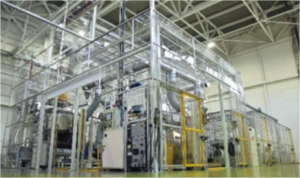 Biogas evidential plant
Biogas evidential plant
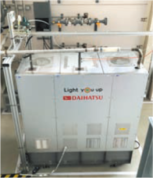 Biogas power generator
Biogas power generator
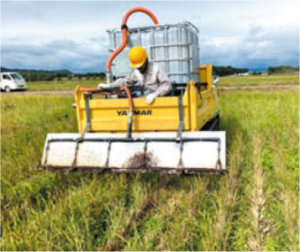 Liquid fertilizer application
Liquid fertilizer application
Outline of the Biogas Project (Local Resource Circulation): Intra-regional Resource Circulation
Reconstruction Assistance for Disaster-affected Areas
Collaborating with the Toyota Group, Daihatsu provides reconstruction assistance to disaster-affected areas as a way to connect more closely with local communities. We began providing company-wide training for disaster volunteer coordinators in November 2024 to prepare for unpredictable disasters that could happen at any time and to quickly and continuously support disaster-affected areas. We will bolster both our “hard” support, like vehicles, and “soft” support as we work to improve our in-house structure to effectively support disaster-affected populations in getting back to their former lives as soon as possible.
Personnel support: Dispatched disaster volunteer coordinators
Other: Disaster relief donation funds
<January 2024: Noto Peninsula Earthquake Disaster>
Personnel support: Dispatched disaster volunteer coordinators, provided local community recovery aid (support with investigating disaster-affected homes in cooperation with local municipal governments)
Other: Disaster relief donation funds, employee fundraising
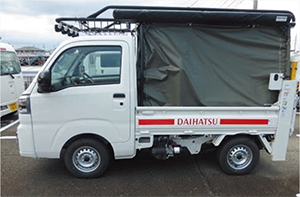 Vehicle loaned for disaster relief
Vehicle loaned for disaster relief
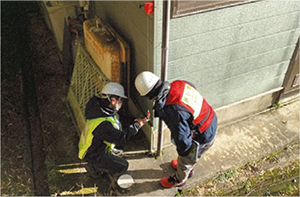 Support with investigating disaster-affected homes for the purpose of issuing disaster victim certificates
Support with investigating disaster-affected homes for the purpose of issuing disaster victim certificates
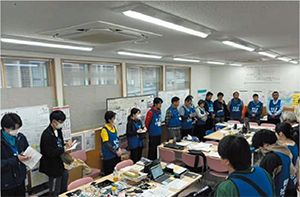 Support for Disaster Volunteer Center operations (Dispatched disaster volunteer coordinators)
Support for Disaster Volunteer Center operations (Dispatched disaster volunteer coordinators)
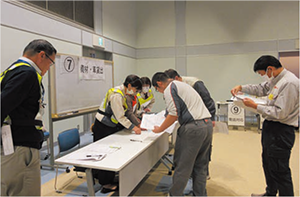 In-house training courses for disaster volunteer coordinators
In-house training courses for disaster volunteer coordinators
Providing Disaster Shelter
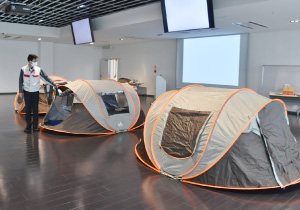 Tents for evacuees to ensure privacy
Tents for evacuees to ensure privacy
The Daihatsu Group Kyushu Development Center provides a facility that can be used as a shelter in the event of a disaster. Public aid, self-aid, and mutual aid are considered important in times of disaster, and Daihatsu aims to fulfill its duty of mutual aid in regional disaster prevention. Typhoon Nanmadol caused extensive damage to Kurume City, Fukuoka Prefecture in September 2022*. During this time, the center provided a facility to be used as a shelter for the local school district, and it was used by 76 neighborhood residents. The facility environment ensured space and privacy for each person as well as air conditioning, and also provided support to those who were anxious in an unfamiliar place.
* Number of times the facility was provided: Six in total
Donations of Discarded Small Appliances
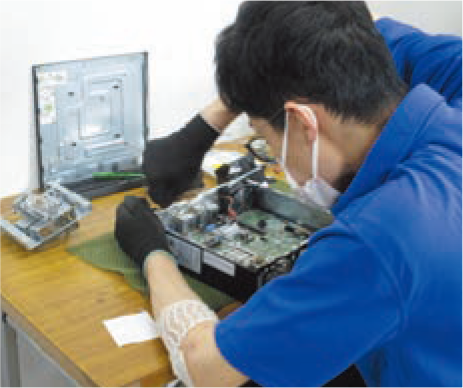
Since May 2024, Daihatsu Kyushu Co., Ltd. has been donating small appliances discarded by business sites to nearby social welfare facilities, where they are stripped for rare metals for reuse. In addition to contributing to resource recycling, this initiative also helps support the employment of disabled individuals working at social welfare facilities.
Donated appliances have totaled 1,075 kg through January 2025, including computers, monitors, printers, and other electronic devices, as well as telephones, clocks, and chargers.
Group Blood Drives
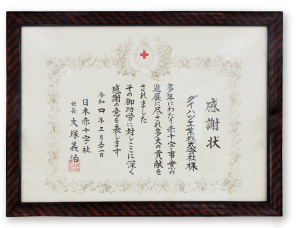 Letter of appreciation from the Japanese Red Cross Society
Letter of appreciation from the Japanese Red Cross Society
Daihatsu has continuously participated in blood donation activities conducted by the Japanese Red Cross Society at each of its business sites over the past 40 years. A total of 24,066 donations were collected from 1980 to November 2024 in the Ikeda area. The area received a letter of appreciation from the Japanese Red Cross Society in 2022 in recognition of contributions from the group blood donation.
Dementia Supporter Training Seminar
At Daihatsu, under our mission of “staying close to our customers and enriching their lives,” we have established “dementia supporter training seminars” to cultivate personnel who are capable of tackling local community issues.
This is a face-to-face program, including group work, that aims to give participants a deeper, more accurate understanding of dementia. Participants who take the course will become “supporters” who will rid themselves of prejudice and look with warm understanding on people with dementia and their families, and they are expected to be able to provide support to those they encounter in their own lives. For example, one of the jobs of a dementia supporter is to show deeper understanding in the event that something happens in their own community in the course of daily life, or to provide a helping hand if someone needs it. The course is primarily intended for employees, and to date 22% of all company employees have taken it. Through this initiative, Daihatsu aims to create barrier-free communities and towns for all kinds of people, and to expand the circle of mutual help.
Facility Tours
Daihatsu introduces its car creating approach and initiatives to many local residents and other stakeholders through facility tours. Humobility1 World is a museum for Daihatsu’s historical materials that is located within the Head (Ikeda) Plant. It is a facility where you can enjoy learning, experience, and discover, and features hands-on exhibitions with the theme of “Thinking about Life, Thinking about Mini-vehicles.” The facility is open to fifth-grade elementary school students on social studies field trips as part of their classes, and also opens to the public on Saturdays. We also conduct social studies tours at our main plants, allowing visitors to observe automobile assembly and inspection line operations. Through these efforts, the public is gaining a broad understanding of the social significance of the automobile industry as well as a deeper understanding of Daihatsu.
1. Humobility: A term combining “human” and “mobility”
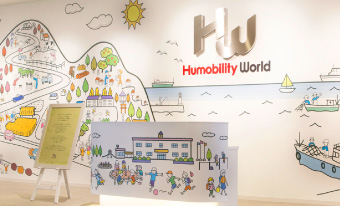
Humobility World
Humobility World is a museum of Daihatsu’s historical materials. Since it opened, it has been introducing the nostalgic vehicles of Daihatsu, a company that has continued creating cars that stay close to people’s daily lives, together with scenes of daily life from each decade. It also features hands-on exhibits where visitors can learn about matters such as the basic principles of automobiles, technologies for safety and security, and environmentally friendly technologies in a manner that is easy to understand. (Tours for the public are held every Saturday.)
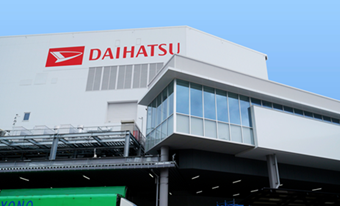
Plant Tours
Tours are offered at the COPEN Factory within the Head (Ikeda) Plant, the Kyoto (Oyamazaki) Plant, and the Shiga (Ryuoh) Plant. Fifth-grade elementary school students are invited to take social studies field trips as part of their classes at the Kyoto (Oyamazaki) Plant, which was upgraded in October 2022.
In addition, Daihatsu Motor Kyushu Co., Ltd., a Group company, also offers social studies plant tours at its Oita (Nakatsu) Plant and Kurume Plant.
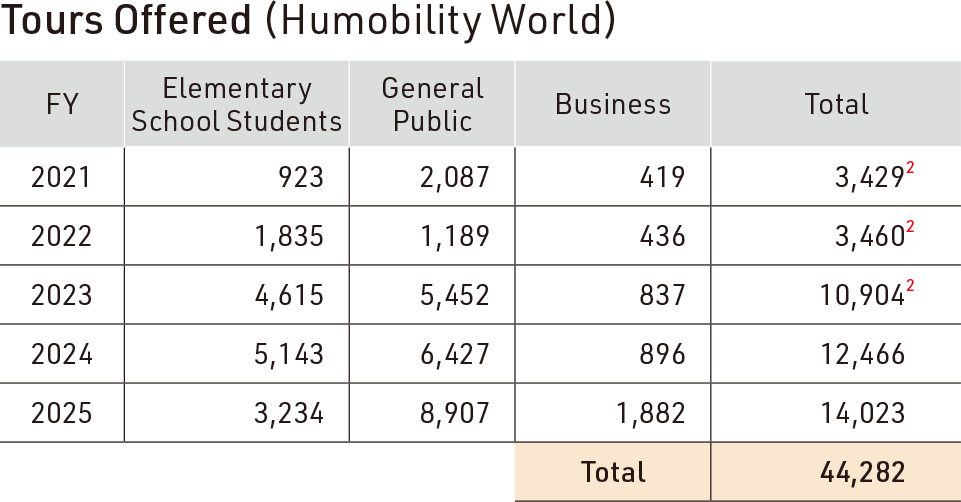
2. Tours were halted during the COVID-19 pandemic to help stop spread of the disease.
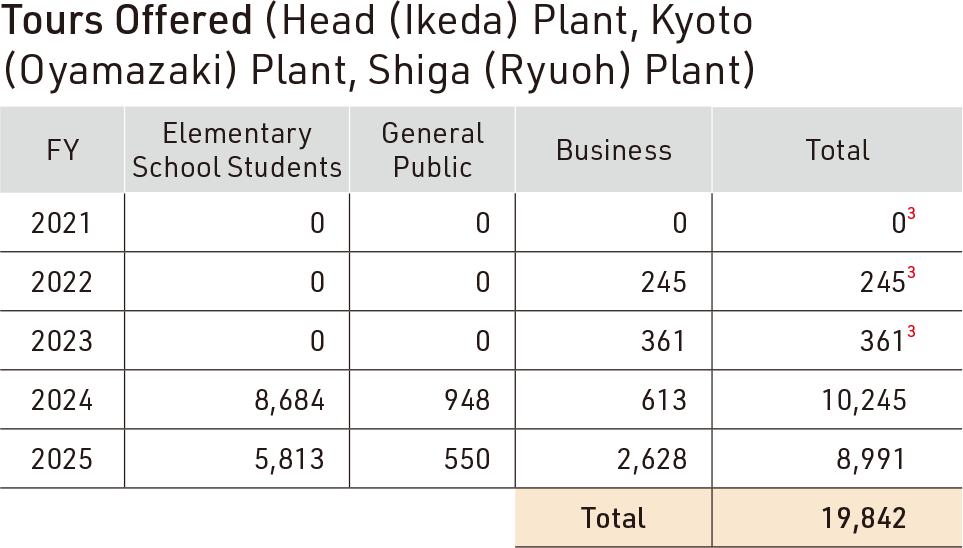
3. Tours were halted during the COVID-19 pandemic to help stop spread of the disease.
Promoting Sports
Daihatsu Track and Field Team
The Daihatsu Track and Field Team was founded in 1988. It aims to inspire and encourage people through the accessible sport of track and field and to contribute to the spread and promotion of sports. The team has produced a number of prominent athletes, including marathon runners selected as representatives at the Olympic Games and the World Athletics Championships. It has achieved excellent results at major competitions in Japan and overseas.
In addition, based on the desire to make the joy of sports accessible to everyone, we set up track and field classes at schools such as elementary schools in Ikeda City, where the Daihatsu head offices are located, and neighboring Kawanishi City, and team members and staff participate and conduct classes as well. The team conveys both the joy of running and Daihatsu’s corporate stance of staying close to customers to children and many other people.
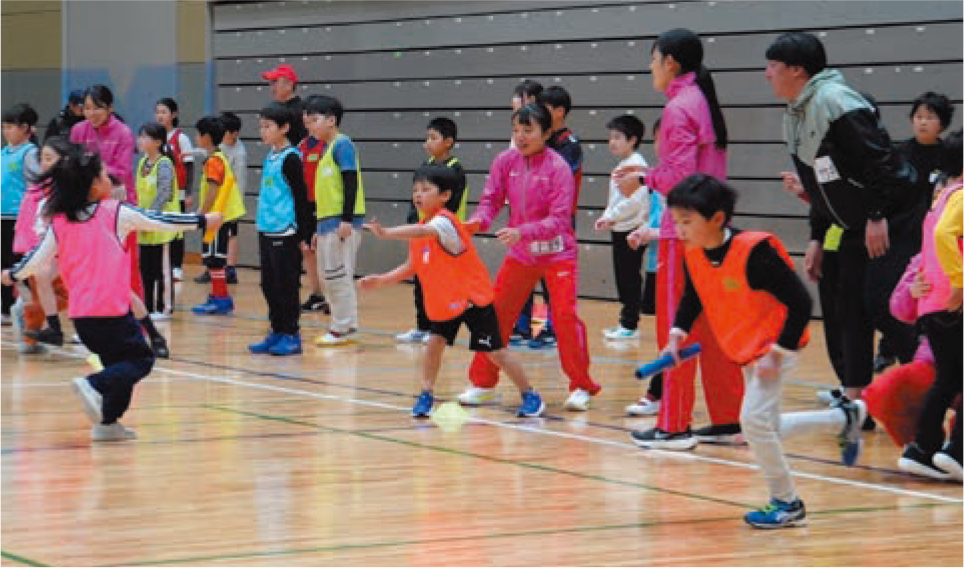 Track and field classes to communicate the joy and importance of sports
Track and field classes to communicate the joy and importance of sports
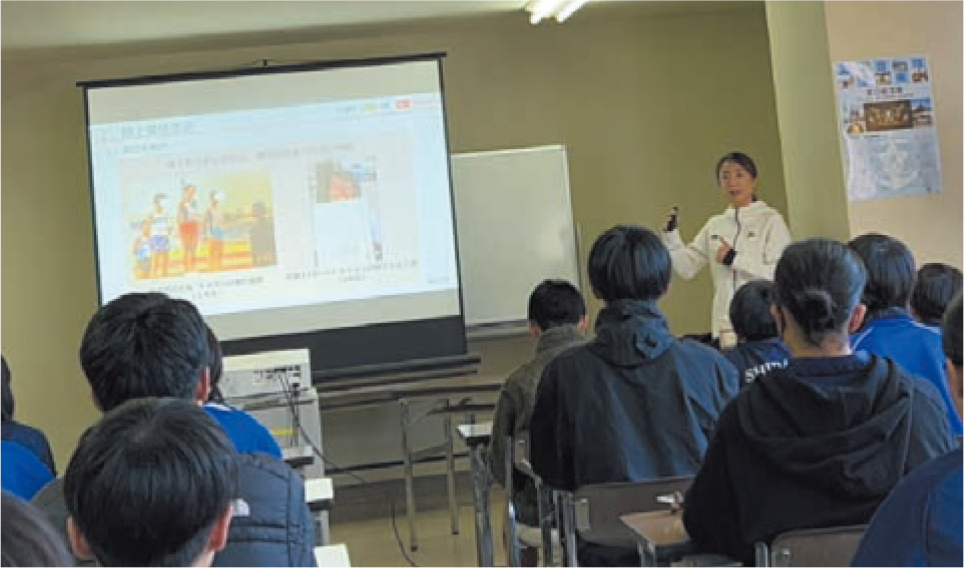 Daihatsu Track and Field Team’s advisor gives a lecture based on her own experience
Daihatsu Track and Field Team’s advisor gives a lecture based on her own experience
Supporting and Nurturing Children
Daihatsu’s MONODUKURI Experience Classes
Daihatsu employees have visited elementary schools near business sites to hold classes for fifth-grade students on the importance and joy of MONODUKURI since 2015. The classes are hands-on experiences where students can see, touch, and use actual parts and tools in order to experience the principles of the manufacturing process that are difficult to convey using textbooks. We have held classes at over 250 elementary schools per year, with the participation of a cumulative annual total of over 20,000 students.
In addition to elementary schools, we also host hands-on classes for children in local communities around our business sites.
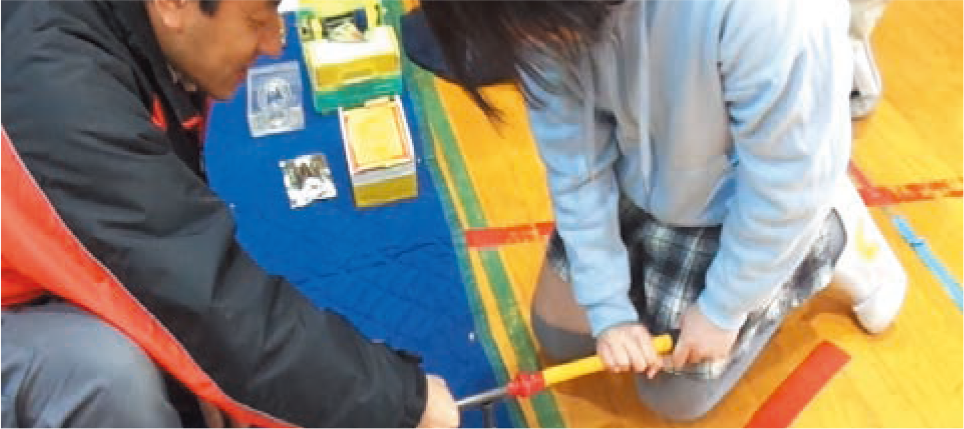 Hands-on activity using a mold and machining steel plates using a press
Hands-on activity using a mold and machining steel plates using a press
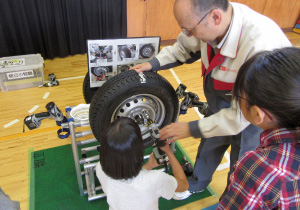 Experiencing tightening nuts on a tire using power tools
Experiencing tightening nuts on a tire using power tools
